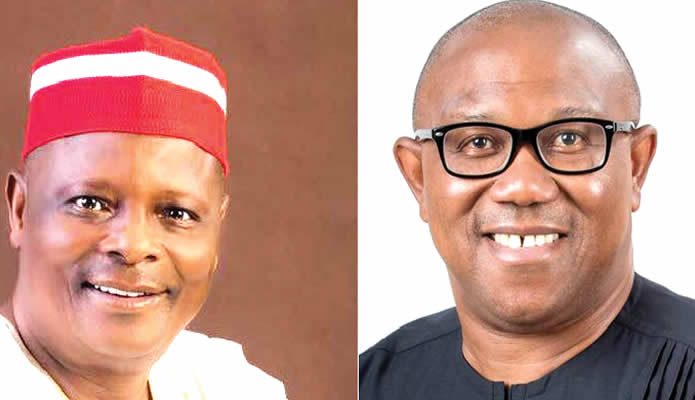The Labour Party (LP) recently expressed its support for Senator Rabiu Kwankwaso’s willingness to serve as a running mate to Peter Obi, the LP’s presidential candidate for the 2027 elections. This unexpected development comes two years after failed merger talks between the LP and Kwankwaso’s New Nigeria People’s Party (NNPP) prior to the 2023 general elections. During a widely shared video, Kwankwaso conveyed his readiness to join forces with Obi, provided specific conditions are fulfilled. He emphasized his political stature, alluding to his educational qualifications and past governance experiences in Kano State, even stating, “I’m bigger than Peter Obi politically.” These remarks highlight a complex relationship between the two leaders, both of whom have aimed to position themselves as significant players in Nigeria’s political landscape.
Kwankwaso’s remarks about his political credentials and past performances as a governor indicate his desire for mutual respect and equity in any partnership with Obi. He mentioned a willingness to engage in earnest discussions to build trust, a necessary step before any collaboration can materialize. This potential alliance raises numerous questions about the political dynamics leading up to the next election as both candidates had faced challenges in the previous elections, with Obi securing over six million votes to Kwankwaso’s approximately 1.5 million. This context underscores a significant disparity in their political followings, even as they might aim to present a united front against incumbent challenges as they look ahead to 2027.
The Labour Party’s National Secretary, Umar Farouk, welcomed Kwankwaso’s overtures, viewing them as a significant shift from his previous stance. Farouk urged Kwankwaso to consider the implications of his comments about being a superior politician, suggesting that ego should not obstruct potential collaboration. By applying pressure on Kwankwaso to refrain from boasting about his qualifications and to understand the changing political environment, Farouk is attempting to recalibrate the dialogue in a way that emphasizes unity over division. Furthermore, he pointed out the political dynamics that will inevitably differ from the previous elections, indicating that public perception and electoral sentiments could be reshaped by emerging socio-political realities by 2027.
In contrast, the landscape for the ruling party, the All Progressives Congress (APC), remains optimistic despite critiques of President Bola Tinubu’s economic reforms. Alhaji Ado Garba Tati, a legislative aide, voiced confidence in Tinubu’s potential to win the presidency with overwhelming support in 2027. This optimism is bolstered by initiatives led by prominent APC figures, including the Deputy President of the Senate, Barau Jibrin, whose programs have reportedly made significant impacts in Kano State. Such initiatives, centered on youth and women’s empowerment, infrastructural development, and agricultural support, have enhanced the APC’s appeal. The emphasis on tangible contributions to the community signifies an understanding of the key issues that resonate with voters and could play a crucial role in driving support for the party.
Tati’s commentary reflected a broader strategy to consolidate power by attracting new members from opposition parties such as the NNPP. With thousands of NNPP supporters reportedly defecting to the APC, there is a visible trend of shifting allegiances that could alter the political momentum in Kano State. This trend underscores a significant aspect of Nigerian politics where local governance and grassroots engagement have substantial influences on national election outcomes. The unfolding political chess game represents a battleground where influence, trust, and developmental initiatives intertwine to shape electoral narratives.
As the political dynamics evolve, both the LP and the APC face the challenge of addressing the underlying discontent among voters regarding economic hardship and governance issues. The political landscape is characterized by fluctuating allegiances, where both parties must navigate nuanced relationships and public expectations in their quest for power. The focus on trust-building and collaborative engagement among opposition factions like the LP and NNPP may serve as a critical pivot point for change, emphasizing the importance of unity to confront a ruling party that remains entrenched in power despite increasing criticisms. The upcoming election offers an opportunity for both established and emerging political leaders to redefine strategies and address pressing concerns within Nigeria, ultimately setting the stage for a potentially transformative electoral cycle in 2027.














